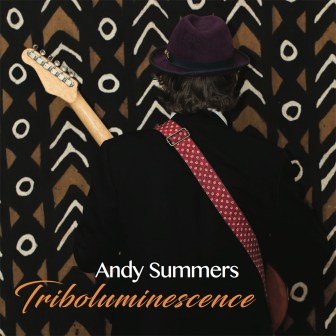
Andy Summers (solo, The Police) • Hit Channel
HIT CHANNEL EXCLUSIVE INTERVIEW: August 2017. We had the great honour to talk with a legendary guitarist: Andy Summers. He is best known as the guitarist of The Police. Over the years he has collaborated with Zoot Money, Soft Machine, The Animals, Robert Fripp, Robert Wyatt, Kevin Ayers, Jon Lord and many others. A few months ago, he released his latest solo album, “Triboluminescence”. Read below the very interesting things he told us:
Are you satisfied with the feedback you got so far from fans and press for “Triboluminescence” album?
Yes, the response for the last album has been very-very good. I’ve got an amazing amount of press for it. I suppose I feel unlike anybody else. You make an effort to make something that it’s worth the time doing it. It would be nice to get those incredible reviews for this. I got crazy reviews, so I have been pleased. I mean, the thing about reviews is feedback. It’s a big question actually, because first of all, the audience for is me and I want to be pleased by the music. If other people like it, then that’s good, but I get to give some ideas while I am doing something that it’s interesting for other people.
Can you please describe to us the musical vision you had on “Triboluminescence”?
I think the musical vision is something that -to some extent- comes while you are making it. You know, it’s like your style is nothing, and you try to find your way into something. I suppose the direction for myself is that I try to find something that sounds new, fresh. I am not just repeating something that somebody else has already done, but I am trying to push it to new territory, as I do it. That is also colored by what I think it is beautiful music. The solos are great, the playing is strong. There are a lot of criteria that I am looking for and that is fulfilled: The music hopefully will be poetic, the playing will be really good. There is very good guitar playing. All these things come into as well. The music is creating an experience to come into, as well as the ideas that are pushing your ship into new waters.
How exciting was it to combine loops with Jazz greats like Thelonious Monk and Miles Davis on songs like “Haunted Doll”?
I like loops. The thing about loops as a musician is that harmonically you can improvise. If you look into a loop, it doesn’t look harmonically like older jazz where there are a lot of chord changes, which in these days seem a bit out of the repertoire. When I was a kid, I grew up learning how to play their chord changes and a lot of guitar players can’t do that. And of course Miles Davis with his modal music in the mid ‘60s, was among the first who paved the way for that: From all these bebop chord progressions, they got to play over one 1 ½ maybe. Of course, to come back to now, in the last years, you can do that with loops. In essence, I find it so exciting modally and the loop in fact becomes a complement, rather than loaded with piano players and bass players who use a lot of different chord changes. The loops become the harmonic backing and I think that makes the sound more contemporary. I like the space that it creates.
What’s the connection between the title of the album and its content?
Actually, the word “triboluminescence” is a scientific word. It means: making light from dark. Striking something to create light. I thought that is a very good metaphor for the act of creating music. You are in a dark room and somehow creativity switches on the light. So, this is what they call “triboluminescence”.
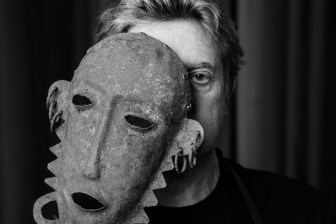 Why you decided to work alone on “Triboluminescence”?
Why you decided to work alone on “Triboluminescence”?
Obviously, I have an engineer. I’m in my studio playing all my instruments: I play the drums, the bass, the keyboards, whatever… Of course, I have done many records with many other musicians. Sometimes, the drummer and the keyboardist translate the music the way you want. All I ‘ve got to do, is for me to do all on my own. I find it very freeing and more creative. I think it’s much more like painting. If I need a bass, I play it. If I want to play the drums, I do it. I do whatever I want and it works for me. This does not mean I am never gonna play with other musicians again. I do play with other people. With the band I toured in China, I played with another guitar player and in Los Angeles too. I do play with other people, but this record, “Triboluminescence”, is very personal and I didn’t really want this to change by someone else. You know, if I had a rhythm section, they would come in and there are certain things that they can play. They would probably be great players, but you are putting me in the position of having (ed: them) to interpret my composition. I become somewhat disappointed by that. So, this way I have to take the whole responsibility of that and I like that.
Did you enjoy the South American tour with Call the Police?
Yeah, it was fantastic. And we are gonna do another one early next year, in January or February, I think. It’s a fantastic band and it’s one the best bands I ever had. Both João Barone (drums) and Rodrigo Santos (bass) are great musicians. It has been a great feel and I really enjoyed it. The fans were very pleased with us. It is a very freeing version of the music of The Police and very enthusiastic (laughs).
How much your guitar playing style has changed over the years?
You know, you never come to a resting place. I hope so. In any musical process, I play my style. I like to play every day and you keep your hands literally and physically moving. A lot of people know my musical style and I think one thing I gave all those years is that this style is me. I have done complicated records and I have been playing jazz and a lot of different things. I did have a sound that people recognize, but I think it has grown more sophisticated over time. It’s delicate to improvise and there are a lot of samples on it. I think as a real musician, as a player, you do all that practice and you try to keep pushing the envelope. But I am not interested necessarily in listening to every record made and try to sound like that band or person. I am who I am. I want to move forward and I think if you listen to “Triboluminescence”, you hear stylistic changes in the way I am approaching music. This record sounds very different than the other records I made many years ago.
What have you discovered after all these years of having an interest in photography?
Yeah, I am interested in photography since the very early days of The Police and I do a lot of shows, a lot of exhibitions. I am hoping to do a new book this year. I like to do photography when I want. Whenever I travel –I travel a lot in Asia- I photograph enough. I am very engaged with it. At the moment, I go through all of my photography since the beginning. I bought a new digital program and it’s really incredible. It is allowing me to go into the mine where I am finding all the books that I have done on photography over the years. I have been able to search through in a different way. I choose to make a lot of different books or statements that maybe are not so easily acceptable to many departments. I am now working on a solo show: I play music improvised to photography that is being streamed on a screen. So, I am taking my photography to different dimensions. I’ll do more exhibitions about that and I am gonna do it live with music as well.
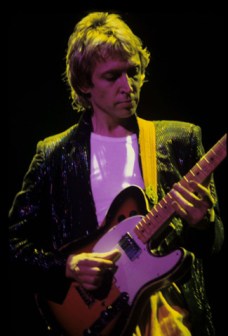 How emotional was it to make the “Can’t Stand Losing You” (2012) documentary?
How emotional was it to make the “Can’t Stand Losing You” (2012) documentary?
I don’t feel it was emotional. People think it has always been very cathartic. It wasn’t really emotional. It was a very long process. The process itself was so involved and long, that I don’t think it was emotional. In fact, it was “Can we make a good film?” It took six years to put together on and off. So, I don’t know if it was emotional. All I know is that in the end, it was like: “ok, let’s get it out there”. It was that kind of feel. I’m flattered that I have done it. And I was very surprised that I know I can write a book (ed: “One Train Later” -2006), which was an achievement and then trying to find people to make a film out of the book.
Did you expect that your composition “Behind My Camel” would win the Grammy Award for Best Rock Instrumental Performance in 1982 and why Sting hated it so much?
It was a difficult little band. There was a lot of friction going on. We got every prize for music at the time. The Police ruled the world and that’s the matter. I mean, in a way, it was lovely and delightful to get a Grammy Award for Best Rock Instrumental Performance.
Had you realized had when you finished “I Advance Masked” (1982) album with Robert Fripp that it was so ahead of its time? It’s an incredible album!
Well, I think it was, maybe. Maybe it’s a pretentious thing to say. It would have been in terms of the pop or world music area. They kept comparing us to serious music or conductor’s music and we said “no”. At the time, it seems that we had done something different with the guitars and it was very influential to a lot of people and it still holds that well. It was a lovely thing to fulfill. So yes, that was what we were saying and I still remember that the record company at the time didn’t want us to make it. They asked: “Why we are you making this?” and “What we have to do with it?”, but then the record went in the top 50 in the Billboard chart (laughs). It was a very emotive thing.
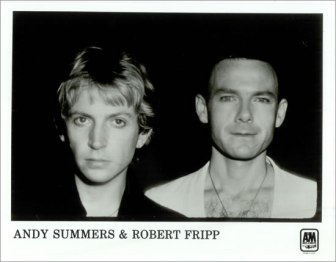 Do you think punk rock had anything to do with music or it was just a marketing invention? I believe the latter.
Do you think punk rock had anything to do with music or it was just a marketing invention? I believe the latter.
There has always been anger in music. Punk didn’t have the monopoly on that. If you look into all the history of how it came about, certainly from Malcolm McLaren’s point of view it was very much a marketing idea, that he basically stole from The New York Dolls in America and he took it to London and changed the whole music industry. From Malcolm McLaren’s perspective, he wasn’t looking for musicians, he was looking for punks and outcasts and all the rest of it. I was in London at the time and The Police was supposed to be a punk band. It was a very fun time but it wasn’t very serious musically. There wasn’t much music on it. It was more about fashion, anger and attitude. But there were one or two bands that were quite good like The Clash, but for all of it no-one can remember now who they were. We started as a punk band but very early we went to the USA and we played the CBGB’s and there were bands like The Talking Heads and Television and they didn’t call it “punk”, they called it “new wave” and that actually sounded closer to our music. Certainly punk is an attitude. It hadn’t much to do with music. It was almost like anti-music and it sounds like anti-music.
Was it an interesting experience to perform “I’m a Believer” on Top of the Pops with Robert Wyatt, Nick Mason, Fred Frith and Richard Sinclair ?
You ‘ve done a lot of research. I remember doing it. I had been in Soft Machine with Robert and he had been in a new situation and I thought to come back when he asked me. I love Robert and I was very happy to do whatever could help him at the particular point.
Do you have any memories of your jam with Jimi Hendrix in Hollywood?
I remember it quite well. It was a great experience. It sort of became a legendary moment. In fact, the actual tapes exist and you can find them on the Internet. I was around Jimi Hendrix quite a lot in those days because the Soft Machine were managed by the then manager of Jimi and you know, Chas Chandler brought Jimi over. I was very much in that scene with Jimi. That particular night I was here in Los Angeles, and I went to see him playing in the studio. Of course, I already knew him. But it was a great experience to get him to play bass (laughs). It was one of the best moments I ever had.
Do you remember The Police concert in Athens, Greece in March 1980?
Yeah, I do. I remember it a lot because of course it’s on a film. There were a lot of problems, there was a riot and it was the first rock concert they had in 13 years. That was a great concert. I think there was a chiefly enthusiastic audience and it was loaded emotionally of course because the kids could come out and hear rebellious rock music for the first time in 13 years after the government crackdown. It was a great band playing a very special moment in Greece where they love this music, from what I remember. We had a very difficult time trying to get in and out of the venue because there were cops everywhere.
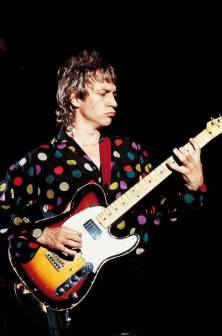 Are you happy with the comeback of the vinyl records?
Are you happy with the comeback of the vinyl records?
I am, actually because I ‘m sitting here with my “Triboluminescence” record and I got a double vinyl. Big, fat, cutie double vinyl album. With all these photographs on the inside, it looks fantastic. The record company made it with “Metal Dog”, which is really good. So, in a way, it’s like the good old days: a fantastic double sleeve vinyl record. The album is a double vinyl, so it got nine extra tracks, which there aren’t on the original “Triboluminescence” CD.
Did you feel comfortable with the rock star lifestyle when you were in the biggest band in world?
(Laughs) I don’t think “comfortable” was the word that I would use. It was very exciting, obviously. It was very intense because we were not just a little pop band with one hit, we were a rock worldwide phenomenon like The Beatles. So, it was quite incredible what we made. It’s much more than a band, we were worldwide famous. In the days we were performing, when you were in public, people would look at you with expectations. There were no quiet times for a large part of 8 years. It was difficult. You were always on, with that kind of band. Of course it was intense, very distracting and you would lose yourself. The full thing was so powerful and arcane, that a lot of people would go under. I think something that I always would like to say about being a part of this band, and what it was, is that we actually were strong together and we would perform to each other. The band wouldn’t collapse. Nobody was like that, because we managed to perform with each other to live the whole experience. In many ways, it was an incredible moment, a great time until we broke up one day (laughs). But we got to do all this music. There were difficulties but we all survived that.
Can you tell us a few words about your friendship with Larry Coryell who passed away a few months ago?
Yes, I was very-very sad to hear about Larry. I can’t believe it because I spent a lot of time with him. We toured together, he played with me in my studio in L.A. I loved him. I thought he was a fantastic musician and guitar player. Very important and he inspired me. He was an inspiring player, totally dedicated to music and a very talented guy. That was a real loss. I still can’t believe this. He did a gig and he died in his sleep. I mean, that was almost what he died for. I don’t know what was wrong with him. I hadn’t seen him for many years.
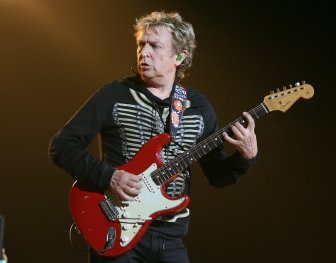 I understand that you are interested in long Greek words like “Synaesthesia” and “Gigantopithecus”. Would you like to send you a list of long Greek words for future use?
I understand that you are interested in long Greek words like “Synaesthesia” and “Gigantopithecus”. Would you like to send you a list of long Greek words for future use?
(Laughs) It’s funny when you put out these words like “synaesthesia” and “gigantopithecus”. I think people are intrigued by those words. Somewhere I heard “Triboluminescence”. “Oh God, what a great word! I will use that somehow”. “Synchronicity” is another example. When we did “Synchronicity” (ed: 1983) no-one knew what it meant. Why not? I think it’s something that you would think in different ways.
I know that you had played at The Speakeasy Club and John Lennon used to go there. Had you ever met John Lennon?
I met him once in the dark. We shook hands and that was all what I did when we met. I met all The Beatles. I met George Harrison in L.A a couple of times. I had met Paul McCartney once.
A huge “THANK YOU” to Mr Andy Summers for his time and to Lisa Roy for her valuable help.
“Triboluminescence” press photos by Mo Summers
Official Andy Summers website: http://andysummers.com
Official Andy Summer Facebook page: https://web.facebook.com/andysummersmusic
